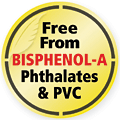This week I had the privilege of interviewing Dr. Alan Greene, a practicing pediatrician, author of Feeding Baby Green and Raising Baby Green and founder of DrGreene.com. We talked about the concern over BPA found in plastics, particularly baby products. While we here at The Fashionable Bambino are strong breastfeeding advocates, we realize that there are many mothers who choose not to breastfeed or simply cannot. Therefore, the products that Dr. Greene and I discussed will be of great interest to those of you just learning about the dangers of BPA or in search of BPA-free products for your baby. 
I first asked Dr. Green to give a definition of BPA in laymen terms and this is what he said,
BPA is the ingredient added to plastics to make it hard and clear. It does a great job at that. Originally, it was developed as one of the first estrogens in the 1930s and people have forgotten about it. It is more efficient in plastics than in medicine. In the early 90’s one of my colleagues found estrogen in yeast, and then found out that it wasn’t in the yeast, it was in the plastic flask and petri dishes. That’s what started the concern.
Low levels of BPA have consistently caused problems in animals. There have been about 200 studies done on animals and about 93% of them show that BPA cause early puberty, increase in breast and prostate cancer, obesity, and attention problems. There have also been findings that men working in factories producing BPA have higher impotence than men not working in BPA factories. The higher levels of BPA, the higher incidence of impotence.
So how do we avoid purchasing products with BPA if BPA is found in plastic products all across the board? We can do so by looking at the recycling number. The good numbers are: 1, 2, 4, and 5; if we see those numbers, we can relax, as it is safe to assume there is no BPA in products with these numbers. Plastic that has the number 7 often has BPA, but not always, so we want the product or container to say BPA-free. If it doesn’t have a number, we want it to at least say BPA-free.
Another place of concern is in canned fruit and soups. Canned green beans have contained the highest levels of BPA. Therefore, purchase frozen veggies or fresh and if you are going to purchase prepared soups, buy them in a carton, as cartons of soup that were tested contained no BPA.
In my own research, one article mentioned this:
The NIH’s National Toxicology Program advised ‘concerned parents’ to reduce their use of canned foods; use BPA-free baby bottles; and opt for glass, porcelain, or stainless-steel containers, particularly for hot foods and liquids.
One of the ways that Dr. Greene raises awareness among his patients and those that he speaks to is to educate them about BPA during pregnancy and during the first three years of the child’s life. He says that by making them aware during this time, they will most likely make the switch to BPA-free products. Dr. Greene acknowledges that there are so many scares out there about one thing or another that it is difficult to know what is a priority and what’s not. As a pediatrician, Dr. Greene believes this is a priority and it is an easy change to implement.
For more information on this, please read December’s issue of Consumer Reports, as they have done a report on this very topic. Thanks for the tip, Dr. Greene!
 Dr. Greene recommends the use of BornFree products, which is the first company to come out with a whole line of BPA-free baby products, which includes baby bottles, training cups, pacifiers, nipples, and a formula dispenser. Even though Dr. Greene is promoting BornFree, he acknowledges that breastfeeding is the best, cleanest and greenest way to nourish your baby.
Dr. Greene recommends the use of BornFree products, which is the first company to come out with a whole line of BPA-free baby products, which includes baby bottles, training cups, pacifiers, nipples, and a formula dispenser. Even though Dr. Greene is promoting BornFree, he acknowledges that breastfeeding is the best, cleanest and greenest way to nourish your baby.
Dr. Green closed our interview by mentioning a small animal study conducted where the animals were given BPA while pregnant, but they also gave folate to them and it nearly eliminated the BPA found in them. Dr. Greene likes to see more studies done, but mentioned this study to emphasize his closing statement:
We want to minimize exposure to toxins where we can, and also maximize great nutrition because it protects us from many things.
Dr. Alan Greene Bio:
Dr. Greene is a graduate of Princeton University and the University of California at San Francisco. Upon completion of his pediatric residency program at Children’s Hospital Medical Center of Northern California he served as Chief Resident. He entered primary care pediatrics in January 1993. He is now a Clinical Professor of Pediatrics at Stanford University School of Medicine, an Attending Pediatrician at Packard Children’s Hospital, and a Senior Fellow at the University California
San Francisco Center for the Health Professions.
Dr. Greene is the Past President of The Organic Center and on the Advisory Board of Healthy Child Healthy World. He is a founding partner of the Collaborative on Health and the Environment. He also consults for the Environmental Working Group.
Stay tuned for a review I will be posting this afternoon about BornFree products.
More Resources:
http://origin-www.fastcompany.com/blog/stephanie-schomer/write/new-study-detects-bpa-levels-infants
http://www.fastcompany.com/magazine/132/the-real-story-on-bpa.html (A very long article, but worth it if you have time to read it.)
http://www.reuters.com/article/pressRelease/idUS226735+03-Nov-2009+PRN20091103 (This specifically mentions how Consumer Reports found BPA in canned foods and health concerns.)
http://www.usatoday.com/news/health/2009-10-28-BPA-bisphenolA-federal-study_N.htm
http://news.yahoo.com/s/hsn/20091111/hl_hsn/bpatiedtoimpotenceinmen (Contains a guide to recycling codes to the left of the article.)